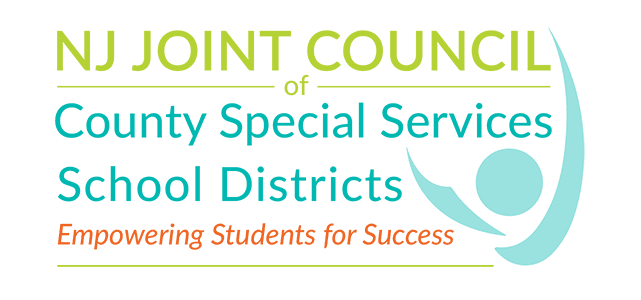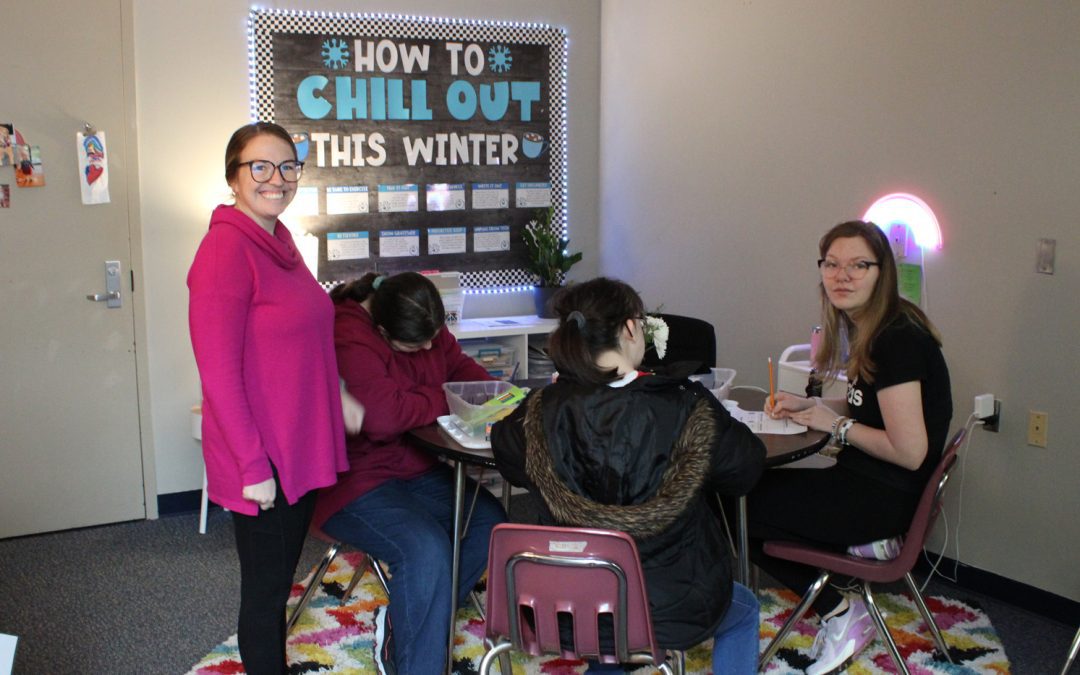The Salem County Special Services School District (SCSSSD) provides high-quality, cost-effective programs and services to the schools and districts of Salem and Cumberland counties as well as parts of Gloucester County. The district promotes itself as a place “where adults with special gifts serve students with special needs.” This ideal is reality. SCSSSD is “special.”
As soon as you set foot on campus, you are greeted by smiling faces and a calm, welcoming atmosphere. SCSSSD–a member of the New Jersey Joint Council of County Special Services School Districts–fosters a safe, healthy and inclusive learning environment that provides positive learning experiences; identifies and sets developmentally appropriate expectations for students to meet their individual goals; and strives to increase students’ achievement levels while addressing their unique learning needs through meaningful and engaging opportunities.
Three campuses serve the students and their diverse range of needs with a tailored educational experience and related services providers who travel between campuses. Cumberland Campus serves school-aged children with severe impairments, Daretown School serves school-aged children with behavioral and emotional disorders, and Salem Campus serves middle and high school-aged students with special needs and is also home to the district’s program for 18- to 21-year-old young adults. The young adults in this program can attend a vocational program or transitional career program.
SCSSSD families are supported throughout their child’s educational career and beyond. Staff members take pride in working with families to put them in touch with supports and resources that can be utilized throughout the student’s adult life.
Cumberland Campus

The Cumberland Campus, located in Bridgeton, features a caring staff of fully certified and highly qualified special education teachers and dedicated instructional assistants. The goal at this campus is to promote each child’s positive self-image and independence. The curriculum in all three programs focuses on receptive and expressive communication, social development, gross and fine motor skills, self-help, and cognition. Students are provided with related services as needed and have access to assistive technology devices to further foster independence through communication.
The Preschool Program utilizes The Creative Curriculum, which balances teacher-directed and child-initiated learning with an emphasis on responding to each child’s learning style and building on strengths and interests. The program for students with autism spectrum disorder provides highly individualized and developmentally appropriate educational experiences. These experiences include development of social engagement, communication, independence and academic growth – essential steps toward the goal of returning the student to a public school setting, when appropriate. The program for Multiply Disabled students promotes positive developmental experiences and independence and encourages the uniqueness of each child.
Daretown School
The Daretown School provides an individualized program to students in kindergarten through grade 12 who experience behavior or emotional regulation impairment. The educational program is focused on special education, with related services, counseling and family involvement in an environment that encourages appropriate social behavior and prepares students for a successful return to their home school district.
Daretown’s current program enrollment consists of mostly middle and high school students, with a team-oriented approach. Weekly team meetings help students collaborate through planning sessions, shared decision-making and shared accountability to ensure a common vision. Students’ academic and behavioral progress is monitored daily through mentoring sessions, small class sizes for individual attention and a behavior-management system focused on rewarding positive social behavior.
Salem Campus
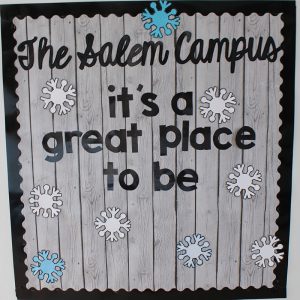 Salem Campus serves students in middle through high school with multiple disabilities and adults up to age 21. Young adults complete their academic work and can participate in vocational training.
Salem Campus serves students in middle through high school with multiple disabilities and adults up to age 21. Young adults complete their academic work and can participate in vocational training.
Over the past couple of years, the program for 18–21-year-olds has steadily grown from one classroom to five and is now the largest population in the building. These young adults learn vocational skills and then transfer what they’ve learned to work outside the school, with the help of a job coach. Experiences are tiered to phase the student into work gradually, making sure they are prepared every step of the way.
Students start off in the Bridge Program, where they participate in stations that mimic the skills they will need to go out and work. The purpose of the stations is twofold: first, they serve as a platform to learn and sharpen new skills and second, as a place to evaluate student progress and strengths before determining the right employment fit.
After the Bridge Program, students go out to job sites for a half day at a time before a placement is finalized. Placements are collaborative and consider each student’s preferences combined with staff member observations to determine where the student would experience the most success. Students are often encouraged to try new experiences. Some students move on to other job sites, where they remain for a full semester, which sometimes leads to full-time employment. The strong partnerships with local businesses that have been cultivated by dedicated SCSSSD staff members are the cornerstone of this program’s success.
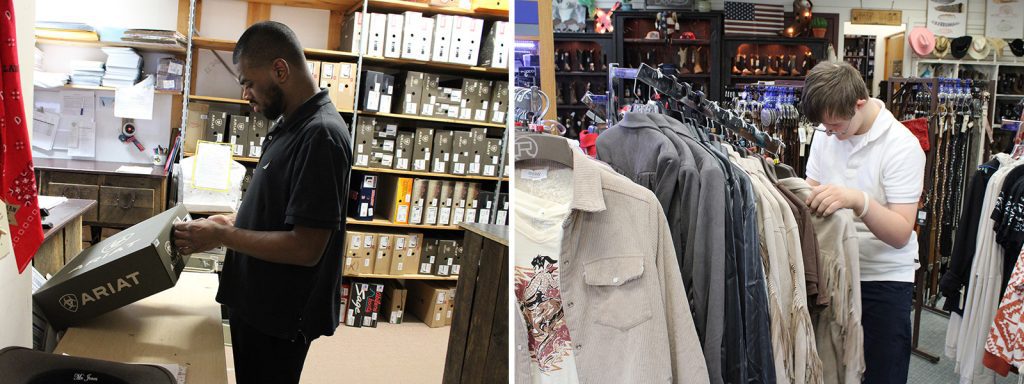
Students work at local retail locations utilizing the skills they have learned through the Bridge Program.
In the Vocational Lab, students go out to a grocery store and shop for the food they will need all week. Students use the groceries to pack food baskets for those in need through a partnership with the South Jersey Food Bank. They also learn how to cook basic meals to help foster independence. They are encouraged to cook for themselves at home to further master cooking skills.
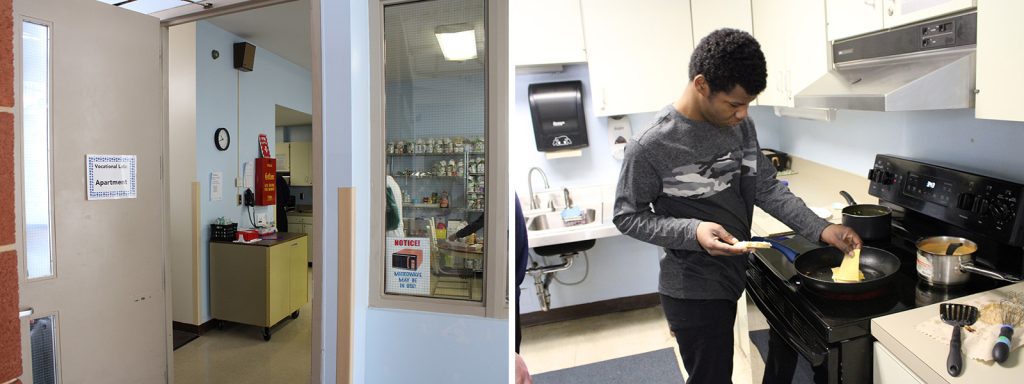
In the Vocational Lab, students learn to prepare meals independently, among other skills.
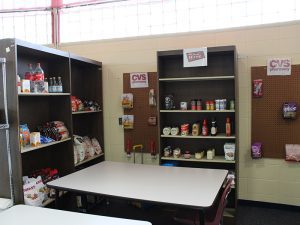
Stations like these help job coaches prepare students for work.
Back at the school store, postsecondary students learn how to work the counter by selling snacks to staff and students. In the afternoon, the store transforms into the job coach room to prepare students for their vocational experiences with stations that represent what they could expect to see working in a bakery, custodial position, CVS, and IGA (a local grocery chain).
Functional and Fun Learning Opportunities
Students at Salem Campus participate in music therapy twice a week, through bell and vocal choirs. Music therapy offers many benefits to the students such as opportunities for socialization, learning self-expression skills, increased coping and self-regulation skills, enhanced auditory processing and strengthened motor skills – in addition to being a fun activity they all look forward to!
Unified Sports is another option for students. The district partners with Salem Tech, who is a member of the Tri-County Conference. The conference runs a Unified Sports program and currently offers athletic opportunities to special needs students such as basketball, bowling, and track as well as other social activities with general education students from within the district. Anyone aged 3 to 21 is eligible to participate.
Special events are also a big part of the school community. Students enjoy rites of passage like the prom and other dances as well as unique events like annual holiday and talent shows. These shows give families an opportunity to come into the building and support their student as they take part in these special school events.
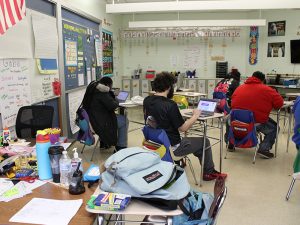
Small teacher-to-student ratios allow for individualized educational experiences
Each class on Salem Campus participates in a Community Based Instruction (CBI) trip at least once a month that is tied to a lesson they’ve learned in the classroom. These trips focus on exposing students to scenarios they may encounter during their everyday life and how to navigate them, but also serve a recreational purpose. Examples of CBI trips are shopping at the mall or grocery store, going to the library, learning to make pottery and a trip to the Ocean City boardwalk at the end of the school year.
The Salem Campus has a partnership with Salem County Career and Technical High School (SCTVS) that affords students from SCSSSD the chance to gain an introduction to the career tracks available to them following graduation. This experience is offered Monday through Thursday for two hours in the afternoon and they are conveniently transported to and from SCTVS by bus.
The caring staff and individualized experiences customized for each student’s success are just some reasons SCSSSD stands out. Each student is prepared for the future and is encouraged to continue receiving support and resources from their SCSSSD team even after they have aged out of the programs.
To learn more about SCSSSD and its offerings, please visit their website scsssd.org.
